026 – ESP32 MicroPython: MFRC522 RFID Module
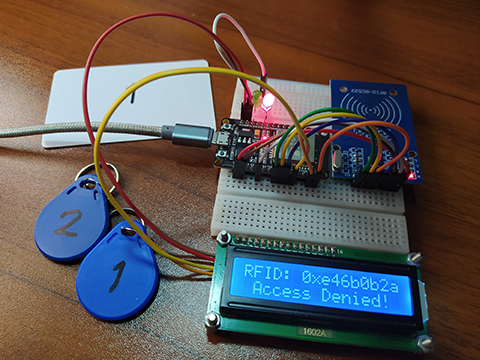
In this article, I will demonstrate how to use an RFID module such as the MFRC522 with ESP32 using MicroPython programming language.
BILL OF MATERIALS
For this lesson, you will need:
- An ESP32 development board.
- An MFRC522 RFID module kit (RFID reader/write, RFID plastic card, RFID key fobs).
- A 16×2 LCD with I2C interface module.
- A red LED.
- A green LED.
- A breadboard.
- And some jumper wires.
CIRCUIT DIAGRAM:
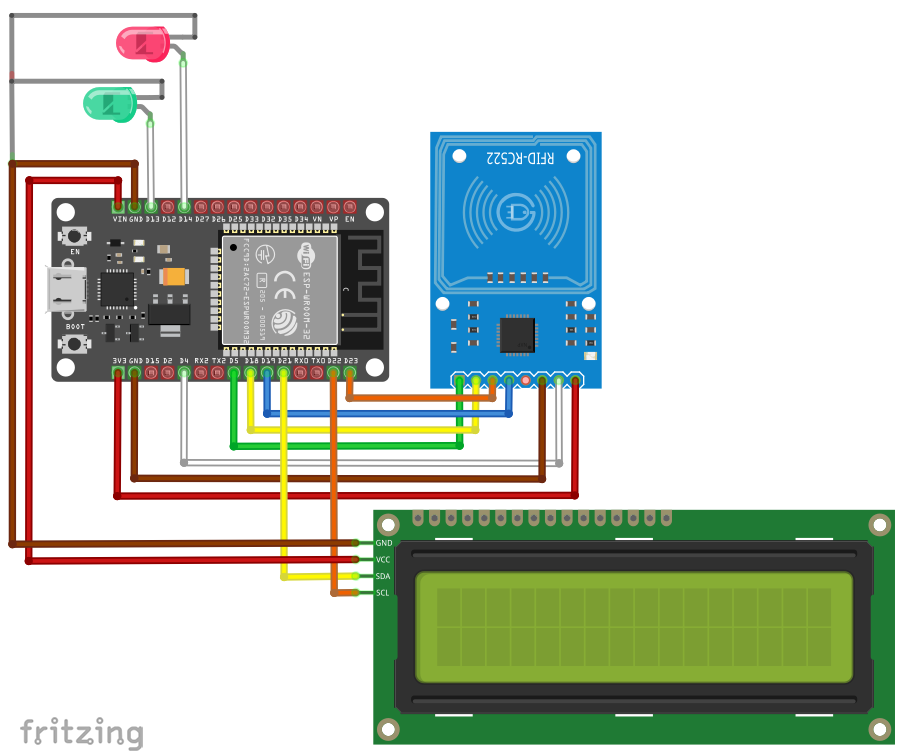
CIRCUIT CONNECTION:
- I connected the RC522 VCC pin or pin # 1 to ESP32 3.3V pin using the red wire.
- Its RST pin or pin # 2 to ESP32 GPIO4 pin using the white wire.
- Its GND pin or pin # 3 to ESP32 GND pin using the brown wire.
- Its IRQ pin or pin # 4 is left unconnected. We will just leaved it not connected and only used a polling method for simplicity.
- Its MISO pin or pin # 5 to ESP32 GPIO 19 pin using the blue wire.
- Its MOSI pin or pin # 6 to ESP32 GPIO 23 pin using the orange wire.
- Its SCK pin or pin # 7 to ESP32 GPIO 18 pin using the yellow wire.
- And lastly, its CS pin or pin # 8 to ESP32 GPIO 5 pin using the green wire.
- Now for the I2C LCD module, I connected the GND pin to ESP32 GND pin using the brown wire.
- Its VCC pin to ESP32 3.3V pin using the red wire.
- Its SDA pin to ESP32 GPIO 22 pin using the yellow wire.
- Its SCL pin to ESP32 GPIO 21 pin using the orange wire.
- I connected the green LED to GPIO 13 and the red LED to GPIO 14.
VIDEO DEMONSTRATION:
If you have any concern regarding this article, write your message in the comment box.
You might also like to support my journey on Youtube by Subscribing. Click this to Subscribe to TechToTinker Youtube channel.
Thank you and I wish you good health.
Regards,
– George Bantique | tech.to.tinker@gmail.com
SOURCE CODE:
1. Example # 1, exploring the basics:
# More details can be found in TechToTinker.blogspot.com
# George Bantique | tech.to.tinker@gmail.com
from mfrc522 import MFRC522
from machine import Pin
from machine import SPI
spi = SPI(2, baudrate=2500000, polarity=0, phase=0)
# Using Hardware SPI pins:
# sck=18 # yellow
# mosi=23 # orange
# miso=19 # blue
# rst=4 # white
# cs=5 # green, DS
# *************************
# To use SoftSPI,
# from machine import SOftSPI
# spi = SoftSPI(baudrate=100000, polarity=0, phase=0, sck=sck, mosi=mosi, miso=miso)
spi.init()
rdr = MFRC522(spi=spi, gpioRst=4, gpioCs=5)
print("Place card")
while True:
(stat, tag_type) = rdr.request(rdr.REQIDL)
if stat == rdr.OK:
(stat, raw_uid) = rdr.anticoll()
if stat == rdr.OK:
card_id = "uid: 0x%02x%02x%02x%02x" % (raw_uid[0], raw_uid[1], raw_uid[2], raw_uid[3])
print(card_id)
2. Example # 2, door security application:
# More details can be found in TechToTinker.blogspot.com
# George Bantique | tech.to.tinker@gmail.com
from mfrc522 import MFRC522
from i2c_lcd import I2cLcd
from machine import Pin
from machine import SoftI2C
from machine import SPI
DEFAULT_I2C_ADDR = 0x20
i2c = SoftI2C(scl=Pin(22, Pin.OUT, Pin.PULL_UP),
sda=Pin(21, Pin.OUT, Pin.PULL_UP),
freq=400000)
lcd = I2cLcd(i2c, DEFAULT_I2C_ADDR, 2, 16)
red = Pin(14, Pin.OUT)
grn = Pin(13, Pin.OUT)
spi = SPI(2, baudrate=2500000, polarity=0, phase=0)
# Using Hardware SPI pins:
# sck=18 # yellow
# mosi=23 # orange
# miso=19 # blue
# rst=4 # white
# cs=5 # green, DS
# *************************
# To use SoftSPI,
# from machine import SOftSPI
# spi = SoftSPI(baudrate=100000, polarity=0, phase=0, sck=sck, mosi=mosi, miso=miso)
spi.init()
rdr = MFRC522(spi=spi, gpioRst=4, gpioCs=5)
print("Place card")
lcd.clear()
lcd.move_to(0, 0)
lcd.putstr("Scan RFID")
while True:
(stat, tag_type) = rdr.request(rdr.REQIDL)
if stat == rdr.OK:
(stat, raw_uid) = rdr.anticoll()
if stat == rdr.OK:
lcd.clear()
lcd.move_to(0, 0)
lcd.putstr("RFID: ")
card_id = "0x%02x%02x%02x%02x" %(raw_uid[0], raw_uid[1], raw_uid[2], raw_uid[3])
print("UID:", card_id)
lcd.move_to(0, 1)
if card_id == "0x57c07f5a":
grn.value(True)
red.value(False)
lcd.putstr(" Access Granted ")
else:
grn.value(False)
red.value(True)
lcd.putstr(" Access Denied! ")
3. Example # 3, attendance system application:
# More details can be found in TechToTinker.blogspot.com
# George Bantique | tech.to.tinker@gmail.com
from mfrc522 import MFRC522
from i2c_lcd import I2cLcd
from machine import Pin
from machine import SoftI2C
from machine import SPI
DEFAULT_I2C_ADDR = 0x20
i2c = SoftI2C(scl=Pin(22, Pin.OUT, Pin.PULL_UP),
sda=Pin(21, Pin.OUT, Pin.PULL_UP),
freq=400000)
lcd = I2cLcd(i2c, DEFAULT_I2C_ADDR, 2, 16)
red = Pin(14, Pin.OUT)
grn = Pin(13, Pin.OUT)
spi = SPI(2, baudrate=2500000, polarity=0, phase=0)
# Using Hardware SPI pins:
# sck=18 # yellow
# mosi=23 # orange
# miso=19 # blue
# rst=4 # white
# cs=5 # green, DS
# *************************
# To use SoftSPI,
# from machine import SOftSPI
# spi = SoftSPI(baudrate=100000, polarity=0, phase=0, sck=sck, mosi=mosi, miso=miso)
spi.init()
rdr = MFRC522(spi=spi, gpioRst=4, gpioCs=5)
rfid_name = ["Teacher1",
"Teacher2",
"Student1",
"Student2",
"Student3"]
rfid_uid = ["0xc97be5a2",
"0xe7458e7a",
"0x2907b498",
"0x29eec498",
"0x59e1f097"]
def get_username(uid):
index = 0
try:
index = rfid_uid.index(uid)
return rfid_name[index]
except:
index = -1
print("RFID is not recognized")
return 0
print("Place card")
lcd.clear()
lcd.move_to(0, 0)
lcd.putstr("Scan RFID")
while True:
(stat, tag_type) = rdr.request(rdr.REQIDL)
if stat == rdr.OK:
(stat, raw_uid) = rdr.anticoll()
if stat == rdr.OK:
lcd.clear()
lcd.move_to(0, 0)
lcd.putstr("RFID: ")
card_id = "0x%02x%02x%02x%02x" %(raw_uid[0], raw_uid[1], raw_uid[2], raw_uid[3])
print("UID:", card_id)
lcd.putstr(card_id)
username = get_username(card_id)
lcd.move_to(0, 1)
if username != 0:
grn.value(True)
red.value(False)
lcd.putstr("Welcome {}".format(username))
else:
grn.value(False)
red.value(True)
lcd.putstr(" Access Denied! ")
4. mfrc522.py RFID driver library:
# https://github.com/cefn/micropython-mfrc522/blob/master/mfrc522.py
from machine import Pin, SPI
from os import uname
emptyRecv = b""
class MFRC522:
GAIN_REG = 0x26
MAX_GAIN = 0x07
OK = 0
NOTAGERR = 1
ERR = 2
REQIDL = 0x26
REQALL = 0x52
AUTHENT1A = 0x60
AUTHENT1B = 0x61
def __init__(self, spi=None, gpioRst=None, gpioCs=None):
if gpioRst is not None:
self.rst = Pin(gpioRst, Pin.OUT)
else:
self.rst = None
assert(gpioCs is not None, "Needs gpioCs") # TODO fails without cableSelect
if gpioCs is not None:
self.cs = Pin(gpioCs, Pin.OUT)
else:
self.cs = None
# TODO CH rationalise which of these are referenced, which can be identical
self.regBuf = bytearray(4)
self.blockWriteBuf = bytearray(18)
self.authBuf = bytearray(12)
self.wregBuf = bytearray(2)
self.rregBuf = bytearray(1)
self.recvBuf = bytearray(16)
self.recvMv = memoryview(self.recvBuf)
if self.rst is not None:
self.rst.value(0)
if self.cs is not None:
self.cs.value(1)
if spi is not None:
self.spi = spi
else:
sck = Pin(14, Pin.OUT)
mosi = Pin(13, Pin.OUT)
miso = Pin(12, Pin.IN)
if uname()[0] == 'WiPy':
self.spi = SPI(0)
self.spi.init(SPI.MASTER, baudrate=1000000, pins=(sck, mosi, miso))
elif uname()[0] == 'esp8266': # TODO update to match https://github.com/cefn/avatap/blob/master/python/host/cockle.py #prepareHost()
self.spi = SPI(baudrate=100000, polarity=0, phase=0, sck=sck, mosi=mosi, miso=miso)
self.spi.init()
else:
raise RuntimeError("Unsupported platform")
if self.rst is not None:
self.rst.value(1)
self.init()
def _wreg(self, reg, val):
if self.cs is not None:
self.cs.value(0)
buf = self.wregBuf
buf[0]=0xff & ((reg << 1) & 0x7e)
buf[1]=0xff & val
self.spi.write(buf)
if self.cs is not None:
self.cs.value(1)
def _rreg(self, reg):
if self.cs is not None:
self.cs.value(0)
buf = self.rregBuf
buf[0]=0xff & (((reg << 1) & 0x7e) | 0x80)
self.spi.write(buf)
val = self.spi.read(1)
if self.cs is not None:
self.cs.value(1)
return val[0]
def _sflags(self, reg, mask):
self._wreg(reg, self._rreg(reg) | mask)
def _cflags(self, reg, mask):
self._wreg(reg, self._rreg(reg) & (~mask))
def _tocard(self, cmd, send, into=None):
recv = emptyRecv
bits = irq_en = wait_irq = n = 0
stat = self.ERR
if cmd == 0x0E:
irq_en = 0x12
wait_irq = 0x10
elif cmd == 0x0C:
irq_en = 0x77
wait_irq = 0x30
self._wreg(0x02, irq_en | 0x80)
self._cflags(0x04, 0x80)
self._sflags(0x0A, 0x80)
self._wreg(0x01, 0x00)
for c in send:
self._wreg(0x09, c)
self._wreg(0x01, cmd)
if cmd == 0x0C:
self._sflags(0x0D, 0x80)
i = 2000
while True:
n = self._rreg(0x04)
i -= 1
if ~((i != 0) and ~(n & 0x01) and ~(n & wait_irq)):
break
self._cflags(0x0D, 0x80)
if i:
if (self._rreg(0x06) & 0x1B) == 0x00:
stat = self.OK
if n & irq_en & 0x01:
stat = self.NOTAGERR
elif cmd == 0x0C:
n = self._rreg(0x0A)
lbits = self._rreg(0x0C) & 0x07
if lbits != 0:
bits = (n - 1) * 8 + lbits
else:
bits = n * 8
if n == 0:
n = 1
elif n > 16:
n = 16
if into is None:
recv = self.recvBuf
else:
recv = into
pos = 0
while pos < n:
recv[pos] = self._rreg(0x09)
pos += 1
if into is None:
recv = self.recvMv[:n]
else:
recv = into
else:
stat = self.ERR
return stat, recv, bits
def _assign_crc(self, data, count):
self._cflags(0x05, 0x04)
self._sflags(0x0A, 0x80)
dataPos = 0
while dataPos < count:
self._wreg(0x09, data[dataPos])
dataPos += 1
self._wreg(0x01, 0x03)
i = 0xFF
while True:
n = self._rreg(0x05)
i -= 1
if not ((i != 0) and not (n & 0x04)):
break
data[count] = self._rreg(0x22)
data[count + 1] = self._rreg(0x21)
def init(self):
self.reset()
self._wreg(0x2A, 0x8D)
self._wreg(0x2B, 0x3E)
self._wreg(0x2D, 30)
self._wreg(0x2C, 0)
self._wreg(0x15, 0x40)
self._wreg(0x11, 0x3D)
self.set_gain(self.MAX_GAIN)
self.antenna_on()
def reset(self):
self._wreg(0x01, 0x0F)
def antenna_on(self, on=True):
if on and ~(self._rreg(0x14) & 0x03):
self._sflags(0x14, 0x03)
else:
self._cflags(0x14, 0x03)
def request(self, mode):
self._wreg(0x0D, 0x07)
(stat, recv, bits) = self._tocard(0x0C, [mode])
if (stat != self.OK) | (bits != 0x10):
stat = self.ERR
return stat, bits
def anticoll(self):
ser_chk = 0
ser = [0x93, 0x20]
self._wreg(0x0D, 0x00)
(stat, recv, bits) = self._tocard(0x0C, ser)
if stat == self.OK:
if len(recv) == 5:
for i in range(4):
ser_chk = ser_chk ^ recv[i]
if ser_chk != recv[4]:
stat = self.ERR
else:
stat = self.ERR
# CH Note bytearray allocation here
return stat, bytearray(recv)
def select_tag(self, ser):
# TODO CH normalise all list manipulation to bytearray, avoid below allocation
buf = bytearray(9)
buf[0] = 0x93
buf[1] = 0x70
buf[2:7] = ser
self._assign_crc(buf, 7)
(stat, recv, bits) = self._tocard(0x0C, buf)
return self.OK if (stat == self.OK) and (bits == 0x18) else self.ERR
def auth(self, mode, addr, sect, ser):
# TODO CH void ser[:4] implicit list allocation
buf = self.authBuf
buf[0]=mode # A or B
buf[1]=addr # block
buf[2:8]=sect # key bytes
buf[8:12]=ser[:4] # 4 bytes of id
return self._tocard(0x0E, buf)[0]
# TODO this may well need to be implemented for vault to properly back out from a card session
# TODO how, why, when is 'HaltA' needed? see https://github.com/cefn/micropython-mfrc522/issues/1
def halt_a(self):
pass
def stop_crypto1(self):
self._cflags(0x08, 0x08)
def set_gain(self, gain):
assert gain <= self.MAX_GAIN
# clear bits
self._cflags(self.GAIN_REG, 0x07<< 4)
# set bits according to gain
self._sflags(self.GAIN_REG, gain << 4)
def read(self, addr, into = None):
buf = self.regBuf
buf[0]=0x30
buf[1]=addr
self._assign_crc(buf, 2)
(stat, recv, _) = self._tocard(0x0C, buf, into=into)
# TODO this logic probably wrong (should be 'into is None'?)
if into is None: # superstitiously avoid returning read buffer memoryview
# CH Note bytearray allocation here
recv = bytearray(recv)
return recv if stat == self.OK else None
def write(self, addr, data):
buf = self.regBuf
buf[0] = 0xA0
buf[1] = addr
self._assign_crc(buf, 2)
(stat, recv, bits) = self._tocard(0x0C, buf)
if not (stat == self.OK) or not (bits == 4) or not ((recv[0] & 0x0F) == 0x0A):
stat = self.ERR
else:
buf = self.blockWriteBuf
i = 0
while i < 16:
buf[i] = data[i] # TODO CH eliminate this, accelerate it?
i += 1
self._assign_crc(buf, 16)
(stat, recv, bits) = self._tocard(0x0C, buf)
if not (stat == self.OK) or not (bits == 4) or not ((recv[0] & 0x0F) == 0x0A):
stat = self.ERR
return stat
5. lcd_api.py LCD driver base library:
"""Provides an API for talking to HD44780 compatible character LCDs."""
import time
class LcdApi:
"""Implements the API for talking with HD44780 compatible character LCDs.
This class only knows what commands to send to the LCD, and not how to get
them to the LCD.
It is expected that a derived class will implement the hal_xxx functions.
"""
# The following constant names were lifted from the avrlib lcd.h
# header file, however, I changed the definitions from bit numbers
# to bit masks.
#
# HD44780 LCD controller command set
LCD_CLR = 0x01 # DB0: clear display
LCD_HOME = 0x02 # DB1: return to home position
LCD_ENTRY_MODE = 0x04 # DB2: set entry mode
LCD_ENTRY_INC = 0x02 # --DB1: increment
LCD_ENTRY_SHIFT = 0x01 # --DB0: shift
LCD_ON_CTRL = 0x08 # DB3: turn lcd/cursor on
LCD_ON_DISPLAY = 0x04 # --DB2: turn display on
LCD_ON_CURSOR = 0x02 # --DB1: turn cursor on
LCD_ON_BLINK = 0x01 # --DB0: blinking cursor
LCD_MOVE = 0x10 # DB4: move cursor/display
LCD_MOVE_DISP = 0x08 # --DB3: move display (0-> move cursor)
LCD_MOVE_RIGHT = 0x04 # --DB2: move right (0-> left)
LCD_FUNCTION = 0x20 # DB5: function set
LCD_FUNCTION_8BIT = 0x10 # --DB4: set 8BIT mode (0->4BIT mode)
LCD_FUNCTION_2LINES = 0x08 # --DB3: two lines (0->one line)
LCD_FUNCTION_10DOTS = 0x04 # --DB2: 5x10 font (0->5x7 font)
LCD_FUNCTION_RESET = 0x30 # See "Initializing by Instruction" section
LCD_CGRAM = 0x40 # DB6: set CG RAM address
LCD_DDRAM = 0x80 # DB7: set DD RAM address
LCD_RS_CMD = 0
LCD_RS_DATA = 1
LCD_RW_WRITE = 0
LCD_RW_READ = 1
def __init__(self, num_lines, num_columns):
self.num_lines = num_lines
if self.num_lines > 4:
self.num_lines = 4
self.num_columns = num_columns
if self.num_columns > 40:
self.num_columns = 40
self.cursor_x = 0
self.cursor_y = 0
self.implied_newline = False
self.backlight = True
self.display_off()
self.backlight_on()
self.clear()
self.hal_write_command(self.LCD_ENTRY_MODE | self.LCD_ENTRY_INC)
self.hide_cursor()
self.display_on()
def clear(self):
"""Clears the LCD display and moves the cursor to the top left
corner.
"""
self.hal_write_command(self.LCD_CLR)
self.hal_write_command(self.LCD_HOME)
self.cursor_x = 0
self.cursor_y = 0
def show_cursor(self):
"""Causes the cursor to be made visible."""
self.hal_write_command(self.LCD_ON_CTRL | self.LCD_ON_DISPLAY |
self.LCD_ON_CURSOR)
def hide_cursor(self):
"""Causes the cursor to be hidden."""
self.hal_write_command(self.LCD_ON_CTRL | self.LCD_ON_DISPLAY)
def blink_cursor_on(self):
"""Turns on the cursor, and makes it blink."""
self.hal_write_command(self.LCD_ON_CTRL | self.LCD_ON_DISPLAY |
self.LCD_ON_CURSOR | self.LCD_ON_BLINK)
def blink_cursor_off(self):
"""Turns on the cursor, and makes it no blink (i.e. be solid)."""
self.hal_write_command(self.LCD_ON_CTRL | self.LCD_ON_DISPLAY |
self.LCD_ON_CURSOR)
def display_on(self):
"""Turns on (i.e. unblanks) the LCD."""
self.hal_write_command(self.LCD_ON_CTRL | self.LCD_ON_DISPLAY)
def display_off(self):
"""Turns off (i.e. blanks) the LCD."""
self.hal_write_command(self.LCD_ON_CTRL)
def backlight_on(self):
"""Turns the backlight on.
This isn't really an LCD command, but some modules have backlight
controls, so this allows the hal to pass through the command.
"""
self.backlight = True
self.hal_backlight_on()
def backlight_off(self):
"""Turns the backlight off.
This isn't really an LCD command, but some modules have backlight
controls, so this allows the hal to pass through the command.
"""
self.backlight = False
self.hal_backlight_off()
def move_to(self, cursor_x, cursor_y):
"""Moves the cursor position to the indicated position. The cursor
position is zero based (i.e. cursor_x == 0 indicates first column).
"""
self.cursor_x = cursor_x
self.cursor_y = cursor_y
addr = cursor_x & 0x3f
if cursor_y & 1:
addr += 0x40 # Lines 1 & 3 add 0x40
if cursor_y & 2: # Lines 2 & 3 add number of columns
addr += self.num_columns
self.hal_write_command(self.LCD_DDRAM | addr)
def putchar(self, char):
"""Writes the indicated character to the LCD at the current cursor
position, and advances the cursor by one position.
"""
if char == 'n':
if self.implied_newline:
# self.implied_newline means we advanced due to a wraparound,
# so if we get a newline right after that we ignore it.
pass
else:
self.cursor_x = self.num_columns
else:
self.hal_write_data(ord(char))
self.cursor_x += 1
if self.cursor_x >= self.num_columns:
self.cursor_x = 0
self.cursor_y += 1
self.implied_newline = (char != 'n')
if self.cursor_y >= self.num_lines:
self.cursor_y = 0
self.move_to(self.cursor_x, self.cursor_y)
def putstr(self, string):
"""Write the indicated string to the LCD at the current cursor
position and advances the cursor position appropriately.
"""
for char in string:
self.putchar(char)
def custom_char(self, location, charmap):
"""Write a character to one of the 8 CGRAM locations, available
as chr(0) through chr(7).
"""
location &= 0x7
self.hal_write_command(self.LCD_CGRAM | (location << 3))
self.hal_sleep_us(40)
for i in range(8):
self.hal_write_data(charmap[i])
self.hal_sleep_us(40)
self.move_to(self.cursor_x, self.cursor_y)
def hal_backlight_on(self):
"""Allows the hal layer to turn the backlight on.
If desired, a derived HAL class will implement this function.
"""
pass
def hal_backlight_off(self):
"""Allows the hal layer to turn the backlight off.
If desired, a derived HAL class will implement this function.
"""
pass
def hal_write_command(self, cmd):
"""Write a command to the LCD.
It is expected that a derived HAL class will implement this
function.
"""
raise NotImplementedError
def hal_write_data(self, data):
"""Write data to the LCD.
It is expected that a derived HAL class will implement this
function.
"""
raise NotImplementedError
def hal_sleep_us(self, usecs):
"""Sleep for some time (given in microseconds)."""
time.sleep_us(usecs)
6. i2c_lcd.py LCD driver library for I2C:
"""Implements a HD44780 character LCD connected via PCF8574 on I2C.
This was tested with: https://www.wemos.cc/product/d1-mini.html"""
from lcd_api import LcdApi
from machine import I2C
from time import sleep_ms
# The PCF8574 has a jumper selectable address: 0x20 - 0x27
#DEFAULT_I2C_ADDR = 0x20
# Defines shifts or masks for the various LCD line attached to the PCF8574
MASK_RS = 0x01
MASK_RW = 0x02
MASK_E = 0x04
SHIFT_BACKLIGHT = 3
SHIFT_DATA = 4
class I2cLcd(LcdApi):
"""Implements a HD44780 character LCD connected via PCF8574 on I2C."""
def __init__(self, i2c, i2c_addr, num_lines, num_columns):
self.i2c = i2c
self.i2c_addr = i2c_addr
self.i2c.writeto(self.i2c_addr, bytearray([0]))
sleep_ms(20) # Allow LCD time to powerup
# Send reset 3 times
self.hal_write_init_nibble(self.LCD_FUNCTION_RESET)
sleep_ms(5) # need to delay at least 4.1 msec
self.hal_write_init_nibble(self.LCD_FUNCTION_RESET)
sleep_ms(1)
self.hal_write_init_nibble(self.LCD_FUNCTION_RESET)
sleep_ms(1)
# Put LCD into 4 bit mode
self.hal_write_init_nibble(self.LCD_FUNCTION)
sleep_ms(1)
LcdApi.__init__(self, num_lines, num_columns)
cmd = self.LCD_FUNCTION
if num_lines > 1:
cmd |= self.LCD_FUNCTION_2LINES
self.hal_write_command(cmd)
def hal_write_init_nibble(self, nibble):
"""Writes an initialization nibble to the LCD.
This particular function is only used during initialization.
"""
byte = ((nibble >> 4) & 0x0f) << SHIFT_DATA
self.i2c.writeto(self.i2c_addr, bytearray([byte | MASK_E]))
self.i2c.writeto(self.i2c_addr, bytearray([byte]))
def hal_backlight_on(self):
"""Allows the hal layer to turn the backlight on."""
self.i2c.writeto(self.i2c_addr, bytearray([1 << SHIFT_BACKLIGHT]))
def hal_backlight_off(self):
"""Allows the hal layer to turn the backlight off."""
self.i2c.writeto(self.i2c_addr, bytearray([0]))
def hal_write_command(self, cmd):
"""Writes a command to the LCD.
Data is latched on the falling edge of E.
"""
byte = ((self.backlight << SHIFT_BACKLIGHT) | (((cmd >> 4) & 0x0f) << SHIFT_DATA))
self.i2c.writeto(self.i2c_addr, bytearray([byte | MASK_E]))
self.i2c.writeto(self.i2c_addr, bytearray([byte]))
byte = ((self.backlight << SHIFT_BACKLIGHT) | ((cmd & 0x0f) << SHIFT_DATA))
self.i2c.writeto(self.i2c_addr, bytearray([byte | MASK_E]))
self.i2c.writeto(self.i2c_addr, bytearray([byte]))
if cmd <= 3:
# The home and clear commands require a worst case delay of 4.1 msec
sleep_ms(5)
def hal_write_data(self, data):
"""Write data to the LCD."""
byte = (MASK_RS | (self.backlight << SHIFT_BACKLIGHT) | (((data >> 4) & 0x0f) << SHIFT_DATA))
self.i2c.writeto(self.i2c_addr, bytearray([byte | MASK_E]))
self.i2c.writeto(self.i2c_addr, bytearray([byte]))
byte = (MASK_RS | (self.backlight << SHIFT_BACKLIGHT) | ((data & 0x0f) << SHIFT_DATA))
self.i2c.writeto(self.i2c_addr, bytearray([byte | MASK_E]))
self.i2c.writeto(self.i2c_addr, bytearray([byte]))
REFERENCES AND CREDITS:
1. Cefn Hoile Github for MFRC522:
2. Dave Hylands Github for I2C LCD:


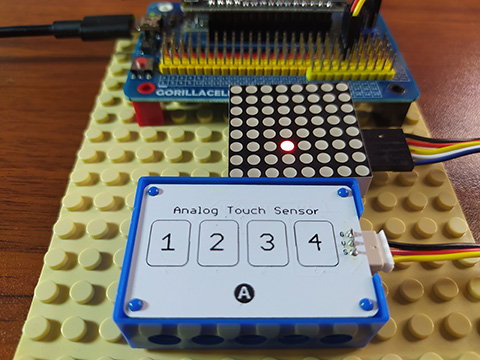
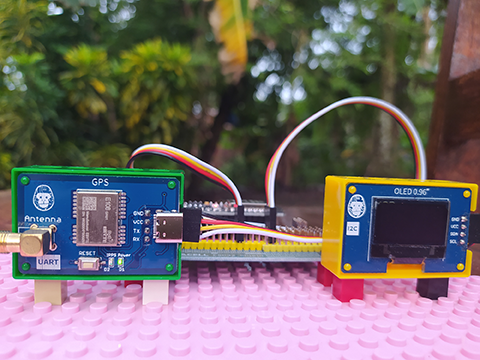
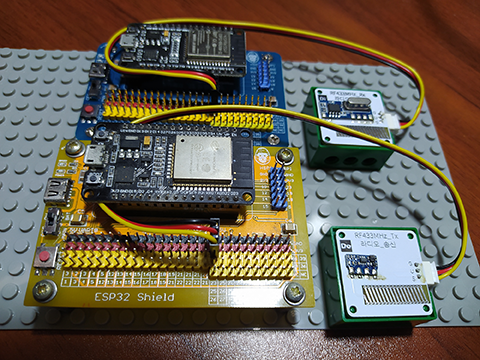
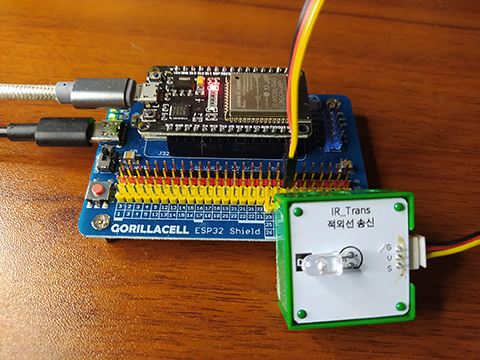
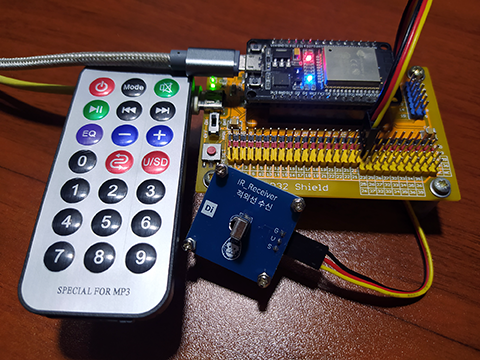
Hello George, I tried this code and the first example worked but after few readings both tags stoped working. I checked both tags and they work. Second program can not read any tag as well. Do you know what could be the issue? Thanks a lot, regards Radim